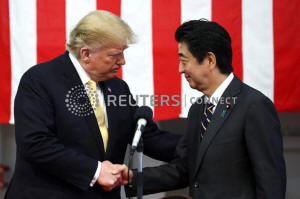|
Trump reassures Tokyo he will stick with
security pact: Japan government
 Send a link to a friend
Send a link to a friend
 [June 25, 2019]
TOKYO (Reuters) - U.S. President
Donald Trump on Tuesday reassured Japan he was committed to a military
treaty that both nations have described as a cornerstone of security in
Asia, after a media report said he had spoken privately about
withdrawing from the pact. [June 25, 2019]
TOKYO (Reuters) - U.S. President
Donald Trump on Tuesday reassured Japan he was committed to a military
treaty that both nations have described as a cornerstone of security in
Asia, after a media report said he had spoken privately about
withdrawing from the pact.
Citing unidentified sources, Bloomberg reported on Monday that Trump had
discussed ending the pact which he believed is one-sided because it
obligated the United States to defend Japan if attacked but did not
require Tokyo to respond in kind.
The report said Trump was also unhappy with plans to relocate the U.S.
base on Japan's Okinawa island.
"The thing reported in the media you mentioned does not exist," chief
government spokesman Yoshihide Suga told reporters in Tokyo when asked
about the report.
"We have received confirmation from the U.S. president it is
incompatible with the U.S. government policy," he added.

Under the security agreement, the United States has committed to defend
Japan, which renounced the right to wage war after its defeat in World
War Two.
Japan in return provides military bases that Washington uses to project
power deep into Asia, including the biggest concentration of U.S.
Marines outside the United States on Okinawa, and the forward deployment
of an aircraft carrier strike group at the Yokosuka naval base near
Tokyo.
Ending the pact, which also puts Japan under the U.S. nuclear umbrella,
could force Washington to withdraw a major portion of its military
forces from Asia at a time when China's military power is growing.
It would also force Japan to seek new alliances in the region and
bolster its own defenses, which in turn could raise concern about
nuclear proliferation in the already tense region.
[to top of second column]
|

President Donald Trump shakes hands with Japan's Prime Minister
Shinzo Abe during delivering a speech to Japanese and U.S. troops as
they aboard Japan Maritime Self-Defense Force's (JMSDF) helicopter
carrier DDH-184 Kaga at JMSDF Yokosuka base in Yokosuka, south of
Tokyo, Japan, May 28, 2019. REUTERS/Athit Perawongmetha/File Photo

Washington's close ties to Tokyo have also benefited U.S. military
contractors such as Lockheed Martin Corp and Raytheon Co, which have
sold billions of dollars of equipment to Japan's Self Defense
Forces.
On a visit to Japan in May, Trump said he expected Japan's military
to reinforce U.S. forces throughout Asia and elsewhere as Tokyo
bolsters the ability of its forces to operate further from its
shores.
Part of that military upgrade includes a commitment by Japan to buy
97 F-35 stealth fighters, including some short take-off and vertical
landing (STOVL)B variants worth more than $8 billion.
Japan says it eventually wants to field a force of around 150 of the
advanced fighter jets, the biggest outside the U.S. military, as it
tries to keep ahead of China's advances in military technology.
(Reporting by Kiyoshi Takenaka; writing by Tim Kelly; editing by
Darren Schuettler)
[© 2019 Thomson Reuters. All rights
reserved.]
Copyright 2019 Reuters. All rights reserved. This material may not be published,
broadcast, rewritten or redistributed.
Thompson Reuters is solely responsible for this content.
 |